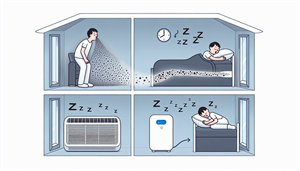
How to Stop Tongue Snoring and Get a Peaceful Night's Sleep
Did you know that your tongue could be the culprit behind those noisy nights and disrupted sleep? Tongue snoring is a common issue that can affect not only your sleep but also your overall health. If left unaddressed, it can lead to more serious health consequences, including sleep apnea. In this article, we will explore the role of the tongue in snoring, ways to identify tongue snoring symptoms, and effective strategies for reducing tongue snoring. Say goodbye to restless nights and hello to peaceful, rejuvenating sleep!
Key Takeaways
Tongue snoring is caused by the tongue’s relaxation during sleep, leading to vibrations and obstruction of the airway. Strategies for reducing tongue snoring include lifestyle changes, positional therapy devices, and using a custom-made device such as SnoreRx Plus. Consulting a sleep specialist can help identify appropriate treatments such as oral appliance therapy or surgical procedures.
The Role of the Tongue in Snoring
The tongue has a significant impact on snoring, as it can obstruct the airway when it relaxes during sleep. This results in vibrations and snoring sounds, and in some cases can lead to severe sleep apnea. Transitioning from light sleep to deep sleep can cause the muscles in the soft palate, tongue, and throat to relax. The resulting partial obstruction of the airway by throat tissues may cause them to vibrate, leading to snoring. It is vital to address tongue snoring since untreated sleep apnea can result in serious health consequences.
How the Tongue Blocks the Airway
As you sleep, the muscles in the upper throat relax, leading to the tongue falling back and blocking the airway. This obstruction can lead to snoring and sleep apnea. The tongue is essential in respiration, as it helps to ensure an unobstructed airway. Positioned at the entrance to the respiratory passage in the throat, it directly influences the inhalation and exhalation of air into the lungs. Tongue positioning can have a significant impact on snoring. When the tongue falls back and obstructs the airway, it can result in snoring. Proper tongue positioning and exercises may help reduce snoring. Abnormal tongue function can contribute to conditions such as oral respiration and malocclusion. Maintaining proper tongue posture and strengthening the tongue and throat muscles can help reduce sleep apnea symptoms.
Factors That Exacerbate Tongue Snoring
Alcohol Consumption: Increases the likelihood of tongue snoring by relaxing the muscles in the mouth and throat, and raises respiratory resistance which can make snoring more severe. Sedatives: Certain sedatives like benzodiazepine receptor agonists (e.g., alprazolam, clonazepam, and diazepam) are linked to an increased risk of tongue snoring. Sleeping Position: Sleeping on one's back can cause the base of the tongue and soft palate to collapse to the back of the throat, obstructing the airway and resulting in snoring. By understanding and addressing these factors, individuals can make necessary adjustments to their lifestyle and sleep habits to potentially reduce the risk of tongue snoring.
Identifying Tongue Snoring Symptoms
Identifying the symptoms of tongue snoring can help decide if medical assistance is necessary. Some indications of tongue snoring include interruptions in respiration, gasping, or choking during rest. Loud snoring followed by periods of silence when breathing stops or nearly stops may signal obstructive sleep apnea (OSA). Individuals with OSA typically experience episodes when breathing slows or ceases at least five times per hour of sleep. Due to the disruption of sleep, individuals with OSA may experience light sleeping, waking up with a loud snort or gasping sound, and excessive daytime sleepiness. If you or your bed partner experience any of these symptoms, it’s important to consult a sleep specialist.


